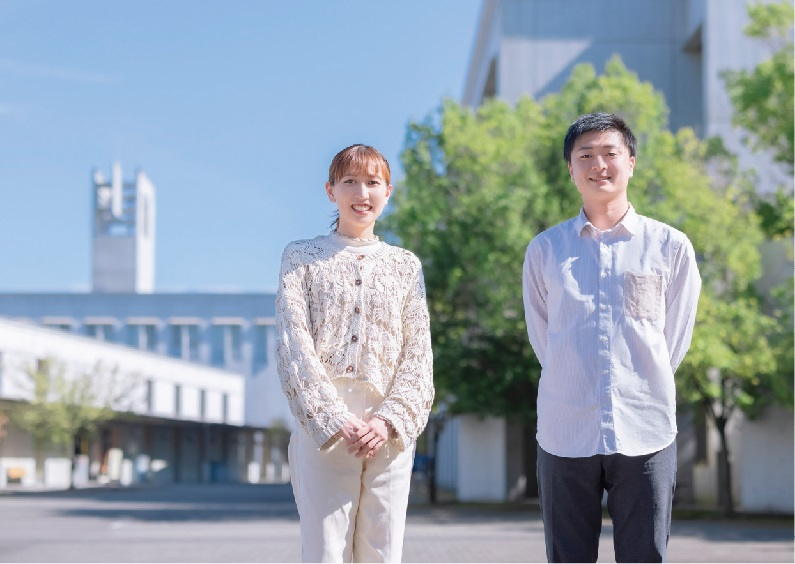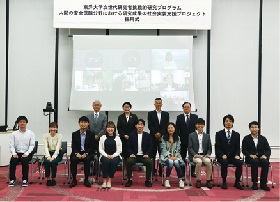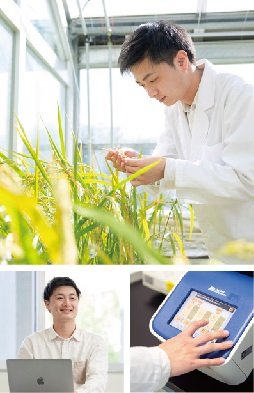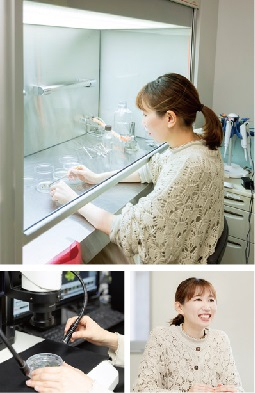About Toyo University Progress:Karin Okazaki/Tatsuki Akabane(1st year student, Doctoral Program, Course of Life Sciences, Graduate School of Life Sciences)
At Toyo University, many students demonstrate their outstanding talents in a wide range of fields, including scholarly and scientific research, sports, and volunteer activities.
In this edition, we interviewed two graduate students who are working on research chosen for the AY2022 Toyo University Support for Pioneering Research Initiated by the Next Generation (SPRING) program.

1st year student, Doctoral Program, Course of Life Sciences, Graduate School of Life Sciences
Karin Okazaki (pictured left)
1st year student, Doctoral Program, Course of Life Sciences, Graduate School of Life Sciences
Tatsuki Akabane (pictured right)
Toyo University Support for Pioneering Research Initiated by the Next Generation (SPRING) Program
Project to Support Social Implementation of Research Outcomes in the Field of Human Security
The Japan Science and Technology Agency (JST) launched the SPRING Program in AY2021. The program aims to develop and produce outstanding doctorate graduates who will contribute to the development of science and technology in Japan. The Japanese Government will support the research activities of doctoral students chosen for the program.
In December 2021, the Project to Support Social Implementation of Research Outcomes in the Field of Human Security, put forward by Professor Hidetoshi Kitawaki of the Faculty of Global and Regional Studies, was chosen for the SPRING Program. We aim to create new academic fields related to human security by using this project as a catalyst to combine existing academic fields. In AY2021, four students were chosen for the SPRING Program, and in AY2022, six students, including Mr. Akabane and Ms. Okazaki, were chosen, with a selection ceremony being held on September 22. We will foster graduates who will take on the challenge of solving social problems that contribute to the realization of all of the SDGs, with a focus on SDG 3 (ensure healthy lives and promote well-being for all at all ages).
 |
 |
I Want to Help People Suffering Globally with Agricultural chemicals I Have Developed
Tatsuki Akabane
Research topic: devolopment of high-yield and high-nutrition brown rice seedlings (crop physiology, protein science, pharmaceutical science, food science)
When I was in my third year of high school, I was invited by a friend to participate in an event for high school students held by Professor Yoshinori Ohsumi, who won the Nobel Prize in Physiology or Medicine. I had always been interested in life sciences, but attending the event strongly reminded me of the breadth and intrigue of this research field. This inspired me to want to enhance my studies of life sciences at university.
At the laboratory I belong to, we are researching increasing rice yield and the development of new varieties of rice, and we also analyze plant functions. I am conducting research aimed at designing chemicals that improve the yield and nutritional value of rice. I am investigating at the molecular level which compounds can inhibit the functions of proteins that negatively affect yield and nutritional value. Cereals are a staple food in developing countries in Asia and Africa, where hunger is a severe problem. It has been thought for some time that improving the yield and nutritional value of rice could improve the supply-demand balance of food in these areas. Crops have been improved through crossbreeding and genetic modification. However, these methods require advanced technology and equipment and therefore are not methods that can be implemented in all countries and regions. That is why I am conducting new research that focuses on something that anyone can do, a method of simply spraying agricultural chemicals.
I entered the world of life sciences out of curiosity. However, when I met and interacted with international students at my laboratory from Sri Lanka and Mozambique—countries where conflict and hunger are ongoing today, I came to realize that it is not simply someone else’s concern. This is now the motivation for my research. In the future, I want to continue screening experiments into candidate compounds. At the same time, I want to conduct more field studies that are not limited to Japan but also take into account the climate and crops in areas that suffer from hunger. My goal for the future is to have one of the agricultural chemicals I design turned into a commercial product.
Becoming a Researcher Who Conducts Research for the Betterment of Society
Karin Okazaki
Research topic: identification of transcription factors that regulate adventitious shoot formation (plant tissue culture, phytohormones, plant physiology, adventitious shoot formation)
I was born in Niigata prefecture, which has abundant nature. As I learned about global problems such as environmental destruction and food shortages, I began to question the difference between these problems and the abundant nature surrounding me. I thought that growing plants more efficiently would solve these problems, and this was the starting point of my research. I am currently researching the regeneration mechanisms of plants. Like humans, plants also have hormones, and I am working to clarify how plant bodies start to produce phytohormones in the regeneration process.
There is a technique called plant tissue culture, which researchers use to increase the number of plants that are difficult to seed or grow due to environmental and other factors. It is a technique that regenerates the whole plant from one part of the plant tissue. In most cases, it is necessary to add phytohormones for regeneration to culture medium that contain the fundamental nutrients required for plant growth. However, the medicinal plant that I am working with, ipecac (Carapichea ipecacuanha), has a high regenerative ability and can easily sprout from the stem just by cutting the stem and placing it on a medium. I believe that clarifying the regenerative mechanism of ipecac and applying it to other plants will facilitate the process of plant tissue culture. Problems remain when applying the ipecac mechanism to other plants as it has little genetic information. However, research has shown that a type of phytohormone called cytokinin produced by ipecac plays a key role. We are currently at the stage of clarifying how cytokinin is produced by ipecac and how it affects shoot regeneration.
I feel the most enjoyment and happiness when experiments based on my hypotheses produce results in line with my expectations or unexpected byproducts. In being selected for the SPRING Program at Toyo University, I am feeling both the difficulty and pressure in attempting to turn basic research into something that can be implemented in society. However, this is also a source of motivation for me to work even harder on my research. In the future, I want to look beyond Japan and to other countries. I will aim to develop an eye for looking at things from multiple perspectives and become a researcher with a wealth of ideas who can verify matters from all angles.